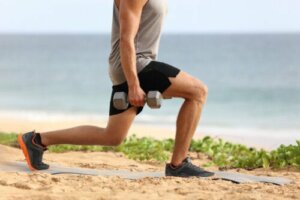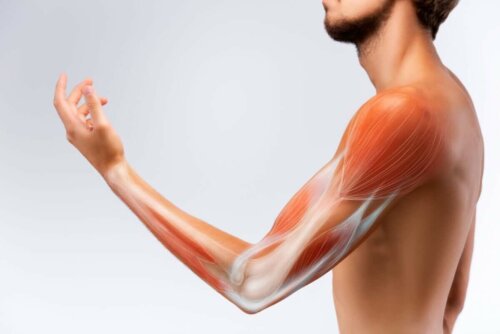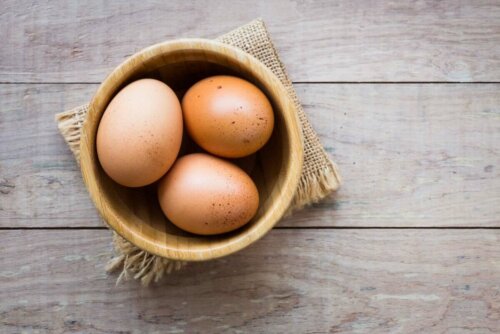Types of Food that Strengthen Tendons and Muscles


Written and verified by the nutritionist Saúl Sánchez Arias
Diet is key when it comes to strengthening muscles and tendons. In fact, our diet greatly impacts their function and performance. Thus, you can prevent atrophy and increase your performance just by changing your eating habits. Keep reading to find out what types of food can strengthen your tendons and muscles so you can include them in your regular meals.
Types of food that can strengthen tendons and muscles
Regardless of your level of physical activity, optimal nutrition can prevent many diseases. It’s common to think of cancer or cardiovascular disease when thinking about conditions with a bad prognosis. However, muscle tissue disorders can also negatively affect your quality of life.
Two essential nutrients can improve the health of lean tissue: protein and vitamin C. High protein intake is key in the prevention of diseases such as sarcopenia according to research published in the Nutrition Research journal. Also, vitamin C has proven indispensable in guaranteeing the endogenous synthesis of collagen. This protein comprises the majority in the human body and is responsible for providing the tissue with its elastic properties.
To strengthen muscles and tendons, you must increase your production of collagen. Here are the best types of food to meet these nutritional demands.

Bluefish
Oily fish have a high content of good fats. These strengthen tendons and muscles, according to a study published in the Mar Drugs journal. You must ensure a regular intake of omega 3 to prevent muscle diseases associated with aging.
Bluefish have a higher percentage of fat in their composition. Thus, species such as salmon and tuna are the most common representatives of this food group. Try to have them at least twice a week as part of a well-balanced diet.
Check out this Effective Diet for Toning Your Muscles
White meats
White meats can also strengthen tendons and muscles and stand out due to their quality protein content. These nutrients contain a significant percentage of leucine, an amino acid closely related to the buildup of lean mass. Their regular intake reduces the risk of muscle atrophy in the long term, according to recent studies.
In fact, a leucine supplement is often offered to enhance recovery and increase the speed of healing in the setting of muscle injuries. There are even protein preparations that contain additional amounts of this amino acid. However, use artificial and commercial forms only under professional guidance.
You may also be interested in The Anatomy of the Back Muscles
Strawberries
We’ve already discussed the importance of vitamin C to maximize collagen synthesis. Strawberries are a high source of this nutrient and can also strengthen tendons and muscles.
This fruit contains a high proportion of this vitamin in their composition and is well above that contained by citrus fruits. Also, mango and guava contain a significant amount of this micronutrient. Also, another good option to guarantee your intake is to consume broccoli and spinach.
Eggs
Weekly intake of eggs was limited by many for years due to their alleged relationship with cardiovascular disease. However, the recognition of the nutritional value of eggs in a regular diet has considerably gone up in recent years. This kind of food doesn’t only not harm your health, but actually improves it.
Also, its supply of high-quality protein is crucial when the goal is to strengthen tendons and muscles. Increasing your consumption of eggs contributes to a gain of muscle mass and reduces the risk of injury.

Some types of food can strengthen tendons and muscles
As you can see, it’s possible to strengthen tendons and muscles through diet as some types of food specifically fulfill this function. However, they must be a part of a well-balanced diet. Keep in mind that both protein and vitamin C are essential nutrients. They’re particularly good when your goal is to maintain the health of your lean tissue and reduce your risk of injury.
Also, you must restrict your consumption of certain types of food that have the opposite effect. Stay away from industrially processed food, especially the kind that contain trans fats, simple sugars, and additives. It’s for this reason that nutritionists always recommend prioritizing your intake of fresh food over those with a low nutritional quality.
If you have any questions, consult a doctor or a nutritionist who can help you optimize your diet so you can strengthen your muscles and tendons.
All cited sources were thoroughly reviewed by our team to ensure their quality, reliability, currency, and validity. The bibliography of this article was considered reliable and of academic or scientific accuracy.
- Naseeb MA., Volpe SL., Protein and exsercise in the prevention of sarcopenia and aging. Nutr Res, 2017. 40: 1-20.
- DePhillipo NN., Aman ZS., Kennedy MI., Begley JP., et al., Efficacy of vitamin C supplementation on collagen synthesis and oxidative stress after musculoskeletal injuries: a systematic review. Orthop J Sports Med, 2018.
- Jeromson S., Gallagher IJ., Galloway SDR., Hamilton DL., Omega 3 fatty acids and skeletal muscle health. Mar Drugs, 2015. 13 (11): 6977-7004.
- Zheng R., Huang S., Zhu J., Lin W., et al., Leucine attenuates muscle atrophy and autophagosome formation by activating PI3K/AKT/mTOR signaling pathway in rotator cuff tears. Cell Tissue Res, 2019. 378 (1): 113-125.
- Villagrán, Marcelo, et al. “Una mirada actual de la vitamina C en salud y enfermedad.” Revista chilena de nutrición 46.6 (2019): 800-808.
- López-Sobaler, Ana M., Aránzazu Aparicio Vizuete, and Rosa M. Ortega. “Papel del huevo en la dieta de deportistas y personas físicamente activas.” Nutrición Hospitalaria 34 (2017): 31-35.
This text is provided for informational purposes only and does not replace consultation with a professional. If in doubt, consult your specialist.








